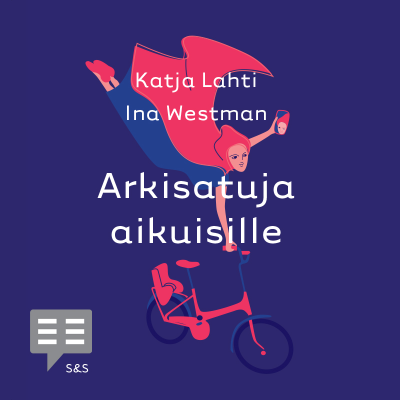
Tearsheet Podcast: Exploring Financial Services Together
Podcast by Tearsheet Studios
Rajoitettu tarjous
3 kuukautta hintaan 1 €
Sitten 7,99 € / kuukausiPeru milloin tahansa.

Enemmän kuin miljoona kuuntelijaa
Tulet rakastamaan Podimoa, etkä ole ainoa
Arvioitu 4.7 App Storessa
Lisää Tearsheet Podcast: Exploring Financial Services Together
Tearsheet is news, opinion, and analysis on the business of finance. Candid conversations with senior executives, fintech entrepreneurs, investors, industry experts -- all weigh in on the trends impacting the industry and the disruptive impact technology is having on the business. Where social media, technology and finance intersect.
Kaikki jaksot
782 jaksotBanking executives face a familiar dilemma: decades-old core systems technically constrain innovation while replacement costs can reach hundreds of millions of dollars and take years to implement. Meanwhile, fintechs launch new products in weeks while traditional banks remain trapped in months-long approval cycles. The challenge extends beyond technology. "Most banks duct-tape capabilities onto what they already have, and eventually they break," explains Ritesh Rihani, Vice President of Enterprise Banking at Galileo. "You've seen the number of outages we've had in the industry recently. That's all happening because they put duct tape upon duct tape." The pressure to modernize comes from multiple directions. Customer expectations have evolved toward integrated experiences and ease of use and operational risks multiply as the pool of COBOL programmers shrinks through retirement. Regulatory compliance becomes increasingly difficult with manual processes and fragmented systems. This podcast explores five critical dimensions of core modernization: balancing costs with competitive necessity, understanding operational and regulatory risks, implementing incremental transformation strategies, enabling product innovation, and unlocking the future potential of modern banking architecture.
Isabelle Guis understands the need for marketing to speak technology's language. With an engineering background, Guis sees her strength as Temenos’ Chief Marketing Officer in bridging the communication gap between technology innovation and the value it brings to customers. In a conversation at the Temenos Regional Forum Americas 2025 held May 28-30 in Miami, Guis explained that Temenos values customer centricity above all else. “There is this reliability, this expertise that’s needed to make sure you deliver,” she said. “And you innovate without compromising what you already have.” Guis also discussed how banks are investing in technology to stay competitive amid economic uncertainty, and why legacy systems can hinder that progress. She outlined paths that banks can take to modernize their core infrastructure, offering alternatives like the choice between cloud or on-premise solutions — or even module-specific upgrades. Guis also shared how Temenos’ new motto “Leading Banking Forward” captures the company’s vision for collective progress in the banking industry. Today’s podcast episode explores Temenos’ customer-centered perspective, the need for digital transformation in banking through modern infrastructure, and the company’s strategic vision of how it can emulate industry-wide progress and leadership.
The infrastructure for crypto-native finance is maturing beyond proof-of-concepts into real financial products. Tokenized securities are moving from experimental pilots to regulated offerings, stablecoin infrastructure is becoming the backbone for 24/7 payment systems, and traditional fintech companies are quietly integrating crypto rails to improve settlement and unlock new capabilities. I'm joined by Juan Lopez, General Partner at VanEck Ventures, where he focuses on investments at the intersection of traditional finance and blockchain technology. Before joining VanEck, Juan was at Circle Ventures, giving him a front-row seat to how institutional-grade crypto infrastructure has developed. His portfolio includes companies building the regulated infrastructure enabling this shift from experimental to operational. Juan's perspective on where real value is being created—from tokenized equity platforms achieving regulatory approval to stablecoin routing systems—offers insight into how crypto infrastructure is becoming essential plumbing for modern financial services. We'll discuss what's driving adoption, where the next wave of exits will come from, and how fintech companies are integrating blockchain technology to improve their core business models.
While co-branded credit cards have dominated consumer wallets for decades, a new option is emerging in the payments landscape. Co-branded debit cards represent an untapped opportunity for brands to deepen customer relationships while addressing the preferences of a generation that increasingly chooses debit over credit. Derek White, CEO of Galileo Financial Technologies, has been at the forefront of this shift. Under his leadership, Galileo recently powered Wyndham Rewards’ launch of what's being called the industry's first co-branded debit card in the US. "The opportunity is huge here, where we have customers that have a deep loyalty with the brand," White explained. The timing for this launch is strategic. 30% of customers are pulling out debit cards when making purchases at major travel and entertainment brands, "even though they're not getting rewards associated with it." This value gap represents millions of transactions where brands could be deepening customer relationships but aren't. Listen to this Tearsheet podcast episode with Derek White to learn about how co-branded debit cards are creating new monetization opportunities for brands, what consumer behaviors are driving this new product, and how the convergence of AI, blockchain, and quantum technologies might fundamentally change how money moves through payment systems.
SMBs are drowning in a sea of disconnected financial tools, juggling separate platforms for banking, payments, accounting, and lending. Many business owners find themselves logging into five or six different systems just to manage their daily operations, creating inefficiency and driving up costs at a time when economic pressures are mounting. U.S. Bank's latest 2025 Small Business Survey shows that SMBs are looking to their FIs to collapse these various digital solutions into one integrated experience. "They are overwhelmed by the number of standalone software solutions which exist in the marketplace," explains Shruti Patel, Chief Product Officer for the Business Banking segment at U.S. Bank. "They would like to consolidate these so that they're not constantly juggling with multiple tools or playing mental gymnastics, all while streamlining costs." The survey data, drawn from approximately 1,000 SMB owners across the country with revenues up to $25 million, shows a clear trend toward viewing banks as comprehensive financial hubs rather than simple repositories for funds. SMBs are seeking integrated solutions that combine banking, payments, and software capabilities under one roof. Listen to this podcast to learn about U.S. Bank’s Shruti Patel is helping U.S. Bank position itself as the primary re-bundlers of financial services in the post-pandemic era.

Arvioitu 4.7 App Storessa
Rajoitettu tarjous
3 kuukautta hintaan 1 €
Sitten 7,99 € / kuukausiPeru milloin tahansa.
Podimon podcastit
Mainoksista vapaa
Maksuttomat podcastit

































